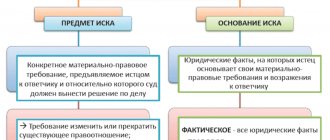Read about the grounds for eviction from a privatized, non-privatized, service or communal apartment on our website.
Initiators
Only a court has the right to forcibly deprive a citizen of the right to reside
What is the procedure regulated by? In its actions, the court relies on the provisions of Article 91 of the Housing Code of the Russian Federation.
Who can file an eviction? The initiators of legal claims may be:
- neighbours;
- municipality;
- state housing inspection.
Find out on our website also how to evict illegal residents, whom the owner has the right to evict from his apartment, and also whether the owner himself can be evicted for violating the rights of his neighbors.
Can anyone be forced to move out?
Not everyone can be deprived of the right to live in a municipal apartment. The legislation does not provide for the eviction of minors or people who are dependent on one of the tenants.
In the case of a person under 18 years of age, difficulties also arise with the eviction of the mother or father, or guardians living with him, since in fact they should be together. Therefore, if an adult is violating, and he has a child, it may also be impossible to take away the right to use the premises. In some cases, if there are good reasons for this, you can try to do this through deprivation of parental rights.
The question of in what cases and on what grounds it is possible to evict minors from residential premises was considered by us here.
Grounds and reasons
The court decision provides for the voluntary eviction of a person, and in case of refusal, the initiation of enforcement proceedings, i.e. transfer of the case to bailiffs.
The reason that a municipality files a lawsuit to deprive a citizen of social housing and terminate a social tenancy agreement may be the following situations:
- the house is intended for demolition as a dilapidated or unsafe building;
- the tenant intentionally damaged or destroyed the residential premises or this was done by persons for whose actions he is responsible;
- the tenant carried out the redevelopment without permission and does not restore the living space to its original condition, despite the requirement of the municipality;
- the tenant is absent from the registered address for a long time;
- the tenant resides illegally;
- the tenant does not use the living space for living, i.e. not on purpose;
- the tenant does not pay receipts for utilities and for renting premises for more than six months;
- the tenant or his family, by their behavior, makes it impossible for neighbors to live together in this apartment;
- the tenant has been deprived of parental rights and the court believes that he cannot live with the children.
Due to non-payment of mandatory payments, eviction involves providing the tenant with another smaller premises, for example, a dormitory. For other points, a citizen can be evicted without providing other housing.
In order to deprive an unwanted tenant of municipal housing, a lot of work will have to be done.
What is the procedure for eviction from public housing?
Legislation
Legal provisions apply to various situations of living in real estate under a social tenancy agreement. So, the main document is the Housing Code of the Russian Federation. Some of his articles concern:
- Art. 92 – about service housing, which, on the basis of Art. -100 is provided for use.
- Art. 83, part 4 – grounds for eviction.
- Decree of the Government of the Russian Federation No. 42 - on the termination of the tenant’s rights to live in a service apartment.
- Art. 84 – eviction of tenants and those registered by court decision.
- Art. 60 – term for concluding a social contract. hiring
- Art. 131 – form of claim for eviction.
- Constitution of the Russian Federation, art. 40 – about the right of citizens to housing.
- Art. 446 Code of Civil Procedure – eviction from an apartment.
Where to start, where to turn?
You need to start by collecting the so-called evidence base .
It is necessary to document the facts on the basis of which the tenant should be evicted from the apartment he occupies.
One complaint is not enough to make such a serious decision as depriving a person of a place to live.
First you need to contact the landlord:
- to the city government;
- to the municipality;
- to the municipal administration;
- to the structure that provides specific residential premises for social rent.
The landlord must take action against the lawbreaker and respond to the applicant within thirty days.
If the measures taken by him did not have the desired effect and the employer continues to violate the law, he will have to go to court.
Responsibilities of persons living in public housing
A resident living in the municipality, on the basis of a drawn up and signed document, is obliged to perform the following actions:
- keep the communal room in order;
- monitor the functioning of all communications;
- pay rent;
- carry out routine repair work;
- do not disturb your neighbors’ rest at night;
- do not convert the property into non-residential premises.
According to the Housing Code, eviction from a municipal apartment can occur due to violation of the obligations of the tenants. The decision to evict a citizen from public housing may be made due to the proven fact of his long-term residence in the territory in question, although he had a residence permit at a different address.
Submission of documents
Each case is individual and the list of documents depends on the reason for which the plaintiff demands to expel the tenant from municipal housing:
- Impossibility of living together - at least two statements to the police are required with answers about the measures taken against the violator.
- Long-term absence - you will need an act indicating the time of absence from the place of residence, certified by the management company.
- Divorce - a copy of the divorce certificate or a copy of the court decision is required.
- In many cases it is necessary to resort to the support of witnesses . These could be employees of service organizations or government agencies, or neighbors. It is a common misconception that relatives cannot be witnesses - this is not true, they can also testify to the required facts.
- A social tenancy agreement confirming the legality of the plaintiff’s residence in the premises is attached to the claim in any case.
- An extract from the house register or a certificate of registered persons is also required for any claim.
Documents and a statement of claim must be submitted to the court of general jurisdiction at the place of residence.
You can file a claim yourself, guided by Articles 131 and 132 of the Code of Civil Procedure of the Russian Federation, but it is better to contact a qualified lawyer.
Correctly, without unnecessary emotions, a statement drawn up , supported by the necessary evidence, increases the likelihood of a positive consideration of the case by the court.
Valid reasons for non-payment
If a municipality or management company has initiated an eviction lawsuit for non-payment of utility bills, then any court, when considering the case, will first of all find out how this rent debt arose. And if it turns out that the reason for the debt is valid, the court will refuse the plaintiff to satisfy his claims.
What reasons are valid:
- Difficult financial situation of the debtor.
- Loss of work due to downsizing or liquidation of an enterprise.
- Long-term arrears in payment of wages.
- Unforeseen expenses for minors or incapacitated family members.
- Long-term serious illness of any family member, resulting in unplanned financial expenses.
- Getting disabled at work or as a result of an accident.
It must be borne in mind that a difficult financial situation due to alcohol abuse or drug addiction is not a valid reason. Also, the court will not accept as a valid reason the fact that the tenant forgot about the need to pay utility bills, or believed that they were too high.
Timing and cost
When filing a claim in court, payment of a state fee is required. In 2021, the state fee for a claim for expulsion from social housing is 300 rubles .
If the plaintiff wishes to use the services of a lawyer, then the cost of filing a claim and protecting his interests will depend on the individual prices of the specialist. Completely conducting a case without the participation of the plaintiff can cost several tens of thousands of rubles.
How long will it take? Practice shows that the expulsion of a tenant from municipal housing is a very long process and will take at least seven months:
- Reception and consideration of the case in court - two months (Article 154 of the Code of Civil Procedure of the Russian Federation).
- The issuance of a court decision and consideration of a cassation appeal takes two months (Articles 119 and 348 of the Code of Civil Procedure of the Russian Federation).
- Return of the case from the cassation instance and issuance of a writ of execution – one month (Article 428 of the Code of Civil Procedure of the Russian Federation).
- Enforcement proceedings in the case by bailiffs, expulsion of a citizen - two months (Article 36-FZ of October 2, 2007 No. 229-FZ “On Enforcement Proceedings”).
And this is with the “ideal” passage of the case through the authorities.
In practice, consideration of the issue may be delayed and the consideration of the case is constantly postponed to a later date due to insufficient evidence, requests for new papers, failure of the defendant to appear, appeal of the court decision, etc.
How to evict a registered person from a municipal (non-privatized) apartment
The law defines eviction from municipal housing as the termination of a social tenancy agreement and the subsequent expulsion of residents from the apartment they occupy. This process can be initiated by:
- manager of residential premises (municipality);
- a representative of the housing inspectorate (if cases of damage to residential premises or violations of the operation of the apartment are identified);
- neighbors (in case their rights are violated);
- OOP (if it is necessary to resettle parents deprived of parental rights).
Procedure, algorithm
The eviction procedure must follow a certain algorithm:
- Complaint to municipal authorities. This could be a collective complaint from neighbors, or a notification to the management company that there is arrears in utility bills.
- A warning to the tenant about the inadmissibility of his actions and the upcoming eviction if the tenant does not correct the situation. The notification is issued by the owner of the residential premises, in this case the local government body.
- Preparation of documents and drawing up a statement of claim for eviction in court.
- Transfer of the claim to the judicial authority at the location of the residential premises.
- Participation in litigation.
- Obtaining a court decision.
- Deregistration of the defendant with the Department of Internal Affairs.
- Forced eviction with the participation of the SSP, the Ministry of Emergency Situations and the police.
Documentation
The following documents are attached to the eviction claim:
- Any identification document if the initiator of the eviction is an individual.
- Power of attorney to conduct the case and identification card if the plaintiff is a representative of the administration.
- Social tenancy agreement for disputed residential premises.
- Receipt for payment of state duty.
- An extract from the house register, which contains information about the tenant and all members of his family.
- Cadastral passport of residential premises.
- Copies of the statement of claim (according to the number of participants in the process).
Evidence base
In addition to the above documents, the plaintiff must substantiate his claims with documentary evidence, which may include:
- Extract from the personal account. Necessary in case of eviction due to debts on utility bills.
- Conclusions of SES, BTI, housing maintenance organization, etc. These documents are necessary to prove the facts of illegal redevelopment, damage to apartment property, and unsanitary conditions in the residential premises.
- Written testimony of witnesses. Provided that these people subsequently give oral testimony in court.
- Law enforcement records. Will be required in case of improper behavior of the employer.
- A court decision on deprivation of parental rights has entered into force. Necessary in case of eviction of a father (mother) deprived of the right to raise a minor.
Cost, terms
The cost of state duty for legal non-property claims is 300 rubles.
It is impossible to determine the exact period during which eviction will occur. Everything will depend on many factors: counterclaims, appeals, complaints - all this can drag out the process for quite a long period of time. Sometimes trials for eviction from public housing last several months, sometimes such litigation lasts more than a year.
Sample statement of claim for eviction from a municipal apartment
The statement of claim for eviction must contain the following information:
- The exact name and location of the judicial authority in which the claim is being filed.
- Information about all participants in the process.
- Preamble. Here the plaintiff must indicate: the exact address of the disputed residential premises;
- ownership of residential premises;
- information on the number of residents in the apartment (list adult residents, then minor children);
- the grounds on which the plaintiff goes to court;
- information about pre-trial settlement methods and the defendant’s reaction to them.
Sample statement of claim for eviction from public housing
Refusal to consider
The case may be refused. When accepting the statement of claim and the documents attached to it, the judge determines whether all documents required by law have been provided .
If he identifies significant deficiencies in the statement of claim itself or in the attached documents, he may temporarily leave it without movement and set a deadline for making corrections.
If the comments are not corrected within this period, the judge has the right to refuse registration and return without consideration.
But this does not mean that the case is completely lost - the identified comments can be taken into account, eliminated and the claim can be filed again.
Eviction from an apartment: procedure under the new law of 2021
In the absence of personal experience, it is better to entrust the preparation of an application to an experienced lawyer on our portal. The claim is filed in court at the address of the relevant property along with other documents:
- social rental agreement;
- a certificate of registered residents from a department of the Ministry of Internal Affairs;
- confirmations of payments (state duties, utilities, etc.);
- certificate of divorce (copy).
The time from the start of a case in court to forced eviction from a municipal apartment can exceed six months. Below are the deadlines in months for significant procedures determined by current legislation:
- reception and registration of documents, making an official decision by the court – 2;
- consideration of the defendant’s appeal – 2;
- return of the case back to the court according to the territorial affiliation of the property – 1;
- registration and delivery of the decision, execution of eviction by the bailiff service – 2.
The possibility of a significant increase in time and financial costs in real conditions should be emphasized. At the acceptance stage, obvious shortcomings in the evidence base and accompanying documents are identified. Additional clarification may be needed during the judicial investigation.
If the procedure is carried out for reasons beyond the control of the tenant (man-made disaster, planned reconstruction), the municipality is obliged to provide housing of similar or better amenities. The exact criteria for this definition have not been established.
A small, older community may not have buildings that meet modern technical and aesthetic standards. The municipality has the right to offer an apartment with worse characteristics if the offender refuses to pay utilities.
With discharge (without provision of housing) they are evicted for the following reasons:
- residential premises are used for organizing commercial activities or for other non-purpose purposes;
- hostel rules are violated;
- redevelopment was made without official approval;
- the citizen is deprived of parental rights;
- unauthorized residence without a rental agreement with the municipality;
- dissolution of marital relations.
Eviction from a municipal apartment without simultaneous provision of housing is prohibited:
- minor children (orphans, dependents);
- pensioners;
- persons who have become disabled;
- family members, missing or dead military personnel (employees of law enforcement agencies of the Russian Federation).
How to evict a registered person from a municipal apartment - having registration at a specific address does not exempt you from performing the duties discussed. However, in this case, the court decision should be additionally transferred to the appropriate police department. Below are features of other typical difficult situations.
A special procedure is in place to protect the rights of young children. A minor child cannot be evicted from an apartment even by a court decision. However, the relevant authorities are unlikely to commit such a violation of current legislation.
To perform such a procedure, it is necessary to obtain special permission from the guardianship and trusteeship authorities. Such consent is given if the conditions at the new permanent residence address are maintained (improved). During the inspection, authorized OO&P employees check:
- area of premises;
- maintaining a separate child’s room;
- technical equipment;
- sanitary and hygienic condition of housing;
- proximity to educational institutions, clinics, and other infrastructure facilities.
If the parents were kicked out of the apartment legally, the children retain the right to reside and future privatization of this property. In such situations, formal guardianship is established.
A special case is divorce. If the child remains with the evicted wife (the apartment is registered under a rental agreement for the former spouse), the rights of the minor noted above are preserved. In this situation, even long-term residence at a different address does not matter.
If the debtor’s only home is under a mortgage, according to the situation in 2021, they can actually be evicted from it. The loan agreement with the bank stipulates that if payment is not made, the bank may file an application with the court to foreclose on the apartment.
The threat of being left without an apartment if it is mortgaged exists both among debtors who have other real estate and among those who do not.
According to the bill, the forced sale of housing for debts can only be carried out by a corresponding court decision. There are corresponding regulations that concern the features of the debtor’s house or apartment, area and cost. If the court rejects the claimant's claim against the owner, the sale of the living space will be considered illegal.
In a case involving debts with subsequent possible eviction, the court must hear the following parties:
- claimant;
- debtor;
- debtor's family members.
The court decides not only the question itself, whether to evict the debtor from the only home or refuse the claimant, but also, in the case of a positive decision in favor of the plaintiff, the amount for which the former owner has the right to buy a new home.
You must decide to purchase a new apartment within 90 days. Otherwise, the funds allocated for this go to the state budget. Local governments provide assistance in finding housing.
The authors of the bill and debt collectors believe that for debtors, the real risk of eviction from their only home will increase payment discipline.
There are several categories of individuals who cannot be evicted from their apartment:
- disabled people of groups I and II;
- minors whose parents have no other housing;
- dependents of the owner;
- single parents;
- those who executed a testamentary refusal;
- those who received real estate under a marriage contract;
- refused privatization in favor of the owner.
The legislation is on the side of the owners and does not allow eviction from the only home in most cases. Neither collection services, nor collectors, nor bailiffs can kick you out of an apartment - this is done only by court decision. If this is initiated by the state, the citizen will be offered housing of equal value. The bill only allows for eviction from a mortgaged apartment or seizure of real estate for debts on alimony and compensation for harm to health.
Utility companies increase tariffs for housing and communal services every year. Some citizens are unable to pay, so there is a risk of eviction from their apartment for debts on utility bills. But is it legal? Not all people delay contributions due to their financial situation; there are debtors who have good reasons.
In 2021, legislation on this issue was updated and changes were made to debt collection. Thus, it is necessary to understand who will face eviction if the housing is municipal and how the owner of the residential premises can be evicted for violating the contract with the housing and communal services.
Failure to pay utility bills threatens with serious problems, which are supported by regulations drawn up according to the letter of the law. The Housing Code has a clear position on this issue
.
It is not so easy to evict from a privatized apartment for rent arrears. Likewise, force a resident to check out if he does not pay his bills
. Any of these procedures can only be carried out through legal action.
A citizen who occupies public housing can be evicted from an apartment for non-payment of utilities. This will happen if the person has not paid rent for six months
. In such a situation, the management company has grounds to file a claim in court.
The defendant has the power to prove that he did not pay for good reason. Even if the court makes a positive decision on the claim, the property owner is obliged to provide the evicted person with other housing, and not throw him out onto the street.
Article No. 293 of the Civil Code of the Russian Federation says that the owner can also lose his home if he does not comply with generally accepted standards:
- Public order disturbance.
- Reconstruction of the building, which is not approved by government agencies.
- If the property is declared unsafe.
When the apartment in which there are utility debts is not the only property the debtor has, then it is much easier to evict him. In this case, the procedure involves the sale of real estate, and the proceeds are used to pay off the housing and communal services debt.
Identical regulations apply to living space that is issued with a mortgage loan. This is explained by Article No. 50 FZ-102
. The judicial authorities have the right to make a positive decision, without providing other housing.
Watch the video: “Rent arrears: are tenants at risk of eviction.”
Despite the fact that Article No. 90 of the Housing Code of the Russian Federation informs about the possibility of eviction of a person for failure to pay utility bills, this can only be done after filing a statement of claim and receiving a writ of execution. Moreover, the state is obliged to provide them with other living quarters
. However, even after this, the debt will not go away and will have to be paid.
Bailiffs will be involved in the seizure of funds or personal property. First, FSSP employees will make an inventory of the contents in the defaulter’s apartment, and then issue an act of seizure of property
. The items are then sold and the proceeds are used to pay off the debt.
It doesn’t matter whether the living space is privatized or non-privatized, eviction for non-payment of utilities occurs strictly in accordance with the relevant acts. New norms in the edited Resolution of the Supreme Court of the Russian Federation No. 14 dated 02
. 07. 2021 establish a certain procedure for this procedure.
A person always has a chance to resolve the issue through a settlement agreement and not be forcibly deprived of housing. Here are the nuances that the management company or employer of the social
. premises can go to court if the period of debt exceeds six months, and the state must provide other housing for living.
Where will the former tenant go?
Eviction can be carried out:
- without providing any place of residence;
- with the provision of a place of residence without amenities;
- with the provision of comfortable housing.
The law does not indicate the criteria by which the livability of the premises provided to replace the old one is assessed, saying only that the premises must be suitable for living with amenities “in relation to the conditions of the locality.”
Thus, in a regional city these may be some conditions, but in a rural settlement they may be different, much less favorable.
Features for certain categories of persons
Each case of forced deprivation of a citizen of municipal housing has its own nuances.
How does forced eviction work?
If a citizen does not comply with the court decision on eviction, then the case is transferred to enforcement proceedings.
In case of forced expulsion, the property remains with its owner; there is no forcible seizure or retention of it.
If the eviction occurs without the provision of other premises , then the property of the evicted person can be stored in specially equipped premises.
To ensure the execution of a court decision - the eviction of a tenant, bailiffs can involve any services to facilitate this: the Ministry of Emergency Situations, the police, etc.
This happens in cases where citizens interfere with the performance of their duties , and then bailiffs have the right to break down doors or demand that an aggressive resident be calmed down.
How to evict a person from a municipal apartment if he is not registered in it? In this case, there are no major legal problems in eviction. As trivial as it may sound, an unregistered person does not have the right to live in a place where he is not registered.
To resolve this issue, you can use three options:
- talk to an unregistered person about voluntarily moving out of the living quarters;
- file a complaint with the local police inspector with a request for forced eviction;
- go to court, and the bailiffs will evict such a tenant.
How does the eviction of a registered person take place? And is it possible to evict a registered person ? In order to evict a registered tenant from an apartment, he must be discharged from there.
Forcibly deregister a person, i.e. The only way to deprive him of his registration is through legal means. The following reasons may provide strong evidence
- a citizen has not paid bills sent to him for utilities or rental housing for more than six months;
- the citizen does not live in this premises for a long time.
Without the provision of other housing (apartment, place in a dormitory), a citizen may be evicted from municipal housing in the following cases:
- loss of the right to reside there;
- initially illegal residence in it.
However, if a citizen does not have the opportunity to settle in another room, for example, he does not have close relatives or he does not have sufficient income to rent housing, the judge may give him a deferment. The law does not allow someone to be forced to become homeless.
If unscrupulous neighbors interfere with your comfortable life, you can evict them from social housing for the following reasons:
- persistent antisocial behavior;
- violations of the rights of other neighbors;
- use of housing for other purposes;
- careless handling of the premises, due to which it may deteriorate or collapse.
✅ Judicial practice
Before making a final decision to evict a person, the court gets acquainted with life circumstances, hears witnesses, studies expert opinions, and looks at archival data. It is far from certain that the owner will be able to evict a tenant who has nowhere to live or is experiencing financial difficulties.
Grounds when forced eviction is impossible:
- utility bills are overdue for less than 6 months;
- debt is associated with a difficult life situation (for example, layoffs at work, expensive treatment, the appearance of dependents);
- deterioration of health;
- retirement.
The examples below will show in which cases the courts evict with the provision of other housing, and in which they refuse new living space.
Example No. 1
The municipal house in the old part of St. Petersburg was in deplorable condition. Residents complained about roof leaks, rusty water, power outages and the threat of supporting structures collapsing. The examination revealed that the house was in disrepair. The assembled commission decided that the house was unsuitable for habitation, was a threat to the life and health of people, and therefore was subject to demolition. Resettlement took place over the next month. Residents of the building were evicted from their old apartments, but were given alternative housing in a new building. This approach complied with the provisions of Art. 85 of the Housing Code of the Russian Federation on the provision of housing after eviction from apartments.
Example No. 2
Verkhovtseva got married and gave birth to a daughter. The father did not show concern for the family, abused alcohol, argued with neighbors, damaged the property of a municipal apartment, and then even raised his hand against Verkhovtseva. The woman immediately contacted the guardianship authorities, who were convinced that the father was not fulfilling his duties and was creating a threat to the life and health of others. The case was brought to court - the father was deprived of parental rights in relation to his daughter. Since the family lived in a municipal apartment, the court decided to evict the father from the premises he occupied. At the same time, according to Art. 91 of the Housing Code of the Russian Federation, the evacuation of the rowdy occurred without the provision of other housing. Thus, the rule regarding the separation of the daughter and the father, who was deprived of parental rights, was fulfilled.
Who can't be evicted?
The law does not allow those registered in this premises to be left without a roof over their head or evicted without providing housing:
- minor children;
- orphans;
- dependents of a deceased employer;
- pensioners who retired due to age;
- disabled people of groups 1 and 2 who became disabled during the performance of official duties or military service;
- disabled people of groups 1 and 2 due to occupational disease;
- the family of a deceased or missing law enforcement officer.
To summarize all that has been said, it should be noted that eviction from municipal housing is, as a rule, a lengthy and very nervous procedure.
But if there are legal grounds for the expulsion of a citizen, strong evidence has been collected and a competent claim has been drawn up, then it will certainly end in success.
If you find an error, please select a piece of text and press Ctrl+Enter.
Can they be evicted for debt if there is a minor child in the family?
The eviction procedure follows the same algorithm as the eviction of a family without children, but when evicting a family with minors, it is necessary to involve the guardianship and trusteeship authorities, which, in turn, are unlikely to allow the eviction of a family with a small child.
Thus, attempts to evict a family with minor children for debts on housing and communal services are unpromising; moreover, if the only basis for eviction is rent arrears, which, in turn, arose due to the difficult financial situation of the family, it will be registered as low-income .








